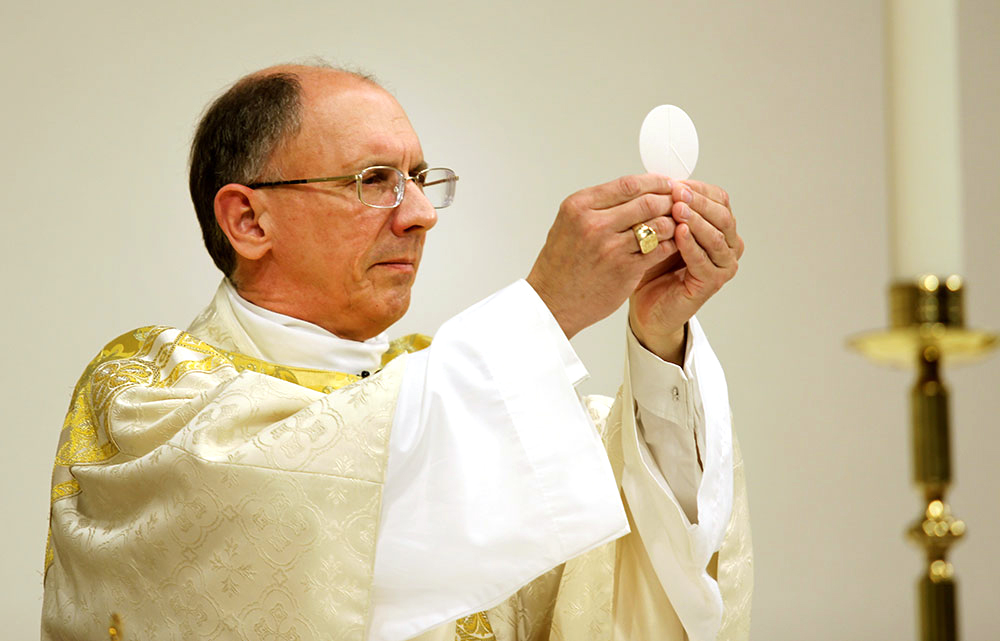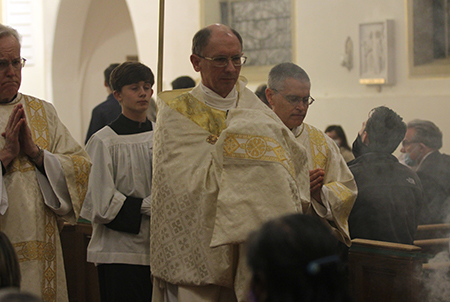BELMONT — Belmont Abbey College is launching its first graduate degree program, a Master of Health Administration, the college announced March 8.
The Master of Health Administration is the degree for leadership in healthcare, and with Belmont Abbey College students will be able to complete the program fully online, the college said in a statement.
“This is a new day on many fronts for our college,” Dr. Travis Feezell, provost of Belmont Abbey College, said in the statement. “With our first graduate degree program, we’re answering not only the aspirations of so many future students but also the needs of our community.
The Master of Health Administration brings to our healthcare professionals a vital knowledge base and skill set so needed today.”
Professionals seeking to advance in their career, develop themselves as leaders, and acquire knowledge and skills in health policy, analysis, finance, marketing, strategic planning and ethics will find the MHA a fit for their goals.
The 16-month MHA curriculum will begin this fall, with additional start times for cohorts beginning in the spring of 2022 and fall of 2022.
MHA tuition is $695 per credit hour including books and fees. The new program will not require a GRE or GMAT for admission and is pending the approval of the Southern Association of Colleges and Schools Commission on Colleges (SACSCOC).
Dr. Gwyndolan Swain will lead the new program. She brings more than 30 years of experience in the healthcare industry as well as nine years managing similar degree programs.
Belmont Abbey College will instruct students fully online, giving professional students the flexibility they seek to advance in their careers.
Dr. Swain will host a webinar introduction to the Masters of Health Administration at 7 p.m. Thursday, April 15. For more information, go online to www.healthcare.bac.edu.
News of the new graduate degree program comes not long after Belmont Abbey College inked a new partnership with CaroMont Health Inc. to build a hospital near campus that will complement the college’s new healthcare degree programs.
Abbey and CaroMont officials officially signed a lease agreement in September 2020 for the construction of the hospital on the abbey’s property, to be named CaroMont Regional Medical Center-Belmont.
The cooperative venture will provide substantial benefits to the Abbey, the college, CaroMont Health and the Gaston County community, officials said in a statement at the time.
The moves are part of the college’s SOAR initiative, which has involved creating new majors at Belmont Abbey College, including degree programs in Nursing and Health Information Management & Analytics, which began welcoming students last fall. Other new majors such as Marketing and Supply Chain Management were also part of this concerted effort.
Students pursuing these healthcare majors are expected to have practicals at the new hospital and use classrooms located on the hospital’s campus. They will also be able to look to the hospital for possible employment opportunities after they graduate.
Officials said the hospital, located east of the college’s main campus off I-85, could open as early as mid-2023, pending state approvals.
— Catholic News Herald
Learn more
Belmont Abbey College will host a webinar introduction to the Masters of Health Administration program at 7 p.m. Thursday, April 15.
For more information, go online to www.healthcare.bac.edu.
‘An expression of Jesus’ love for us’

'He’s giving us a model to follow: charity, which is love of our neighbor because of the love of God that we have in our heart.' — Bishop Peter Jugis
CHARLOTTE — On Holy Thursday, Bishop Peter Jugis celebrated the Mass of the Lord’s Supper at St. Patrick Cathedral. The Holy Thursday liturgy April 1 marked the start of the Triduum, the three holy days preceding the Resurrection of the Lord at Easter.
Unlike last year when churches were closed because of the COVID-19 pandemic and all Holy Week liturgies had to be streamed online, this year people were able to gather spaced apart in the pews in limited numbers in accordance with public health protocols.
The Mass of the Lord's Supper memorializes Jesus' celebration of the Passover meal, His washing the feet of His disciples, His agony in the Garden of Gethsemane, and His betrayal and arrest. It also commemorates the institution of the Eucharist, the priesthood and the Mass that we still celebrate today in His memory.
Jesus’ actions on Holy Thursday and leading up to His crucifixion on Good Friday illustrate how Jesus “loves to the end,” Bishop Jugis said in his homily. “The proper way to understand what is happening to Jesus these days is (as) an expression of His love.”
“Jesus is coming to the end,” the bishop explained. “He is coming to the supreme moment of His life – the reason He came, for the forgiveness of sins and for our salvation, by offering His life as the ransom for our salvation.”
Jesus willingly offers up His life when He is arrested, tortured and crucified. “He wills that, He wants that,” Bishop Jugis said. “It’s a sign of His love for us.”
“Everything He does, to the very end, is an expression of His great love for us.”
Furthermore, Jesus commands His disciples to follow His example of sacrificial love: “As I have done, you are to do.”
“He’s giving us a model to follow: charity, which is love of our neighbor because of the love of God that we have in our heart,” Bishop Jugis said. “Charity is unselfish love …thinking only of the good of others, as Jesus does.”
Not only is this the theme of the holy days of the Triduum, Bishop Jugis noted, it is the theme for this year’s Diocese of Charlotte Eucharistic Congress: “As I Have Loved You,” taken from the Gospel of John (13:34). The annual gathering of Catholics from across western North Carolina is scheduled for Sept. 17-18 at the Charlotte Convention Center.
 The entire Scripture passage is what we should take to heart, the bishop said: “ As I have loved you, so you also should love one another.”
The entire Scripture passage is what we should take to heart, the bishop said: “ As I have loved you, so you also should love one another.”
“Charity – that is what we are celebrating, the charity of Jesus Christ, which is a model: the giving of His life … for our salvation,” he said. “So, also, we are to offer ourselves in love (and) in service to one another.”
At the end of the Holy Thursday Mass, altars in every church were stripped bare, candles and lights were extinguished, and the Blessed Sacrament was transferred to a temporary altar of repose until Easter – outwardly demonstrating the sense of the Church's bereavement during the time of Christ's Passion and burial.
Catholics then spent time in Eucharistic Adoration, recalling Jesus' words to His sleepy disciples in the Garden of Gethsemane, "Could you not keep watch with Me for one hour?"
On Good Friday, no Mass is celebrated.
— Catholic News Herald. Photos by SueAnn Howell, senior reporter.
At top: Bishop Peter Jugis elevates the Host during the Mass of the Lord's Supper. Above: he carries the Blessed Sacrament, taken from the tabernacle in the cathedral, in a procession to an altar of repose for Holy Thursday night.

